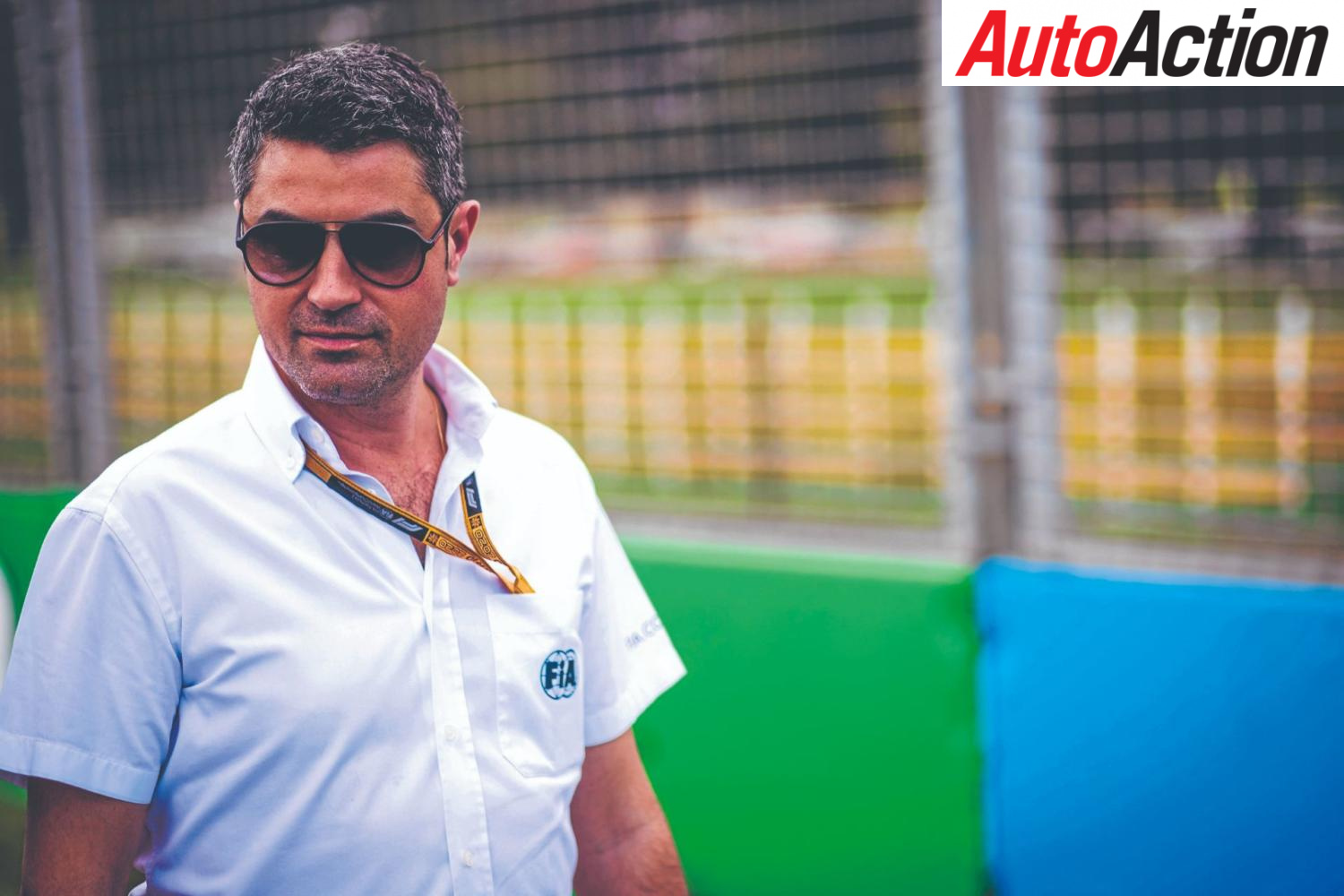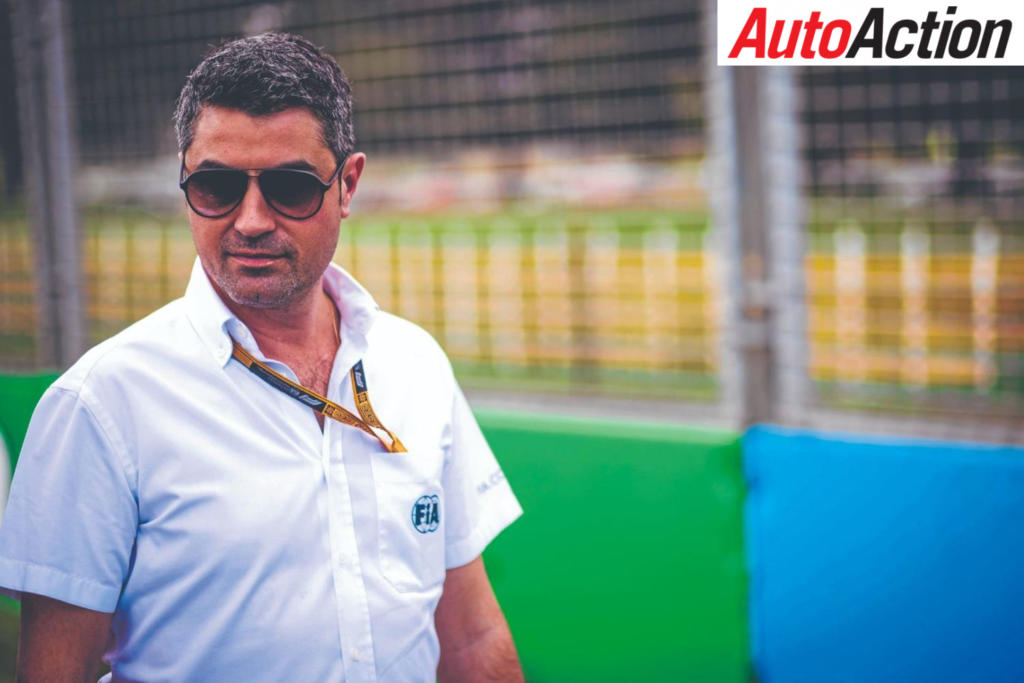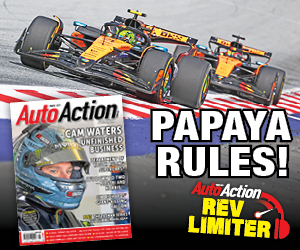MICHAEL MASI – OPERATING IN ISOLATION

By Bruce Williams
Date posted: 9 June 2020

Michael Masi – Operating in Isolation
Formula 1 race director Michael Masi is the latest subject to be grilled by Foges in his regular Up Front interview series.
Masi discusses the effect COVID-19 has had on Formula 1 events and the way they will be run, how he is involved in the decision making, his career ascendency and a reflection of his first year in Formula 1’s hot seat.
The following is a sample of the interview featured in Auto Action #1787.
What – and how much – is happening to get F1 going again?
There’s a huge amount going on, Mark. I think a number of us within the industry can say it’s probably the busiest time that we’ve ever had. I’m fortunate enough that, by circumstance, I’m here at home in Australia, but spending most nights in video conferences during the European day. Then I spend the day here catching up on all the work that mounts up. So there’s a lot going on, particularly with the return to racing being the huge focus at the moment, with the FIA and F1 working together on getting the F1 championship back up and running and aiming for the first weekend in July in Austria.
Speaking of challenges, you were obviously right in the middle of all the discussions that led to the cancellation of the Australian Grand Prix. You were front and centre when the announcement was made, but you said nothing.
That’s very true.
Why didn’t you at least present the FIA’s point of view?
From a joint F1 and FIA perspective, it had been a very, very long night and what Chase (Carey) delivered from a Formula 1 view was effectively that of the FIA as well. I was there in case there were any specific sporting or FIA related queries, but there weren’t, so if I had spoken, all I would have done was repeat what had already been said by Chase and Paul Little and Andrew Westacott from the Australian Grand Prix Corporation. We’d all worked closely from when we all found out the night before (about a McLaren team member testing positive). Chase had only arrived from Vietnam that morning, but there was a number of us that literally had a sleepless night.
What brought the whole thing underdone? Did they panic?
From my end, if you look at it in perspective, at the time in Australia the level of what COVID-19 was hadn’t really come out. Looking back now on the way it rolled out, effectively the cancellation of the AGP was the first major sporting event to be called off and the catalyst for what happened over the next seven days. It led the world and 10 days later here, we were all pretty much in lockdown.
Read the rest of the interview in the Auto Action Issue 1787, available right now.
Also make sure you follow us on social media Facebook, Twitter, Instagram or our weekly email newsletter for all the latest updates between issues.
Recent Stories
array (
0 =>
WP_Term::__set_state(array(
'term_id' => 37,
'name' => 'F1',
'slug' => 'f1',
'term_group' => 0,
'term_taxonomy_id' => 37,
'taxonomy' => 'category',
'description' => 'An Introduction to Formula One (F1)
Formula One, or F1, is the highest class of single-seater auto racing, governed by the Fédération Internationale de l\'Automobile (FIA) and is owned by Liberty Media. The name "Formula One" refers to the set of rules or formula that all cars and drivers must comply with.
The F1 season consists of a series of races, known as Grands Prix, held on purpose-built circuits or public roads around the world. The results of each race are combined to determine two annual championships: one for drivers and one for constructors (teams).
The history of Formula One can be traced back to the pre-war Grand Prix racing, which featured open-wheel cars with supercharged engines. The first World Championship of Drivers was organised by the FIA in 1950, following the end of World War II. The first race was held at Silverstone, England, and was won by Giuseppe Farina, driving an Alfa Romeo. The first constructors\' championship was introduced in 1958 and was won by Vanwall.
Formula One has seen many changes and innovations over the years, both in terms of technology and regulations. Some of the most notable developments include the introduction of rear-engined cars in the late 1950s, the use of aerodynamic wings in the late 1960s, the adoption of turbocharged engines in the late 1970s, the emergence of electronic driver aids in the late 1980s, the switch to V10 and then V8 engines in the 1990s and 2000s, and the introduction of hybrid power units in 2014.
Formula One has also produced some of the greatest drivers and rivalries in the history of motorsport. Some of the most famous names include Juan Manuel Fangio, Jim Clark, Jackie Stewart, Niki Lauda, Ayrton Senna, Alain Prost, Michael Schumacher, Lewis Hamilton, and Sebastian Vettel. Some of the most intense battles for the championship have been between Fangio and Stirling Moss in the 1950s, Lauda and James Hunt in the 1970s, Senna and Prost in the late 1980s, Schumacher and Mika Hakkinen in the late 1990s, and Hamilton and Vettel in the 2010s.
Formula One is widely regarded as the pinnacle of motorsport, attracting millions of fans and viewers worldwide. The sport is also a huge business, involving billions of dollars in revenue and expenditure. The teams compete for prize money, sponsorship deals, and media rights, while the drivers earn millions of dollars in salaries and endorsements. The sport is also influenced by politics, regulations, and controversies, such as doping scandals, espionage cases, safety issues, and environmental concerns.
The following is a list of all F1 World Drivers Champions by year, from 1950 to 2020:
1950-1959
1950: Giuseppe Farina (Italy) - Alfa Romeo 158, Alfa Romeo
1951: Juan Manuel Fangio (Argentina) - Alfa Romeo 159, Alfa Romeo
1952: Alberto Ascari (Italy) - Ferrari 500, Ferrari
1953: Alberto Ascari (Italy) - Ferrari 500, Ferrari
1954: Juan Manuel Fangio (Argentina) - Maserati 250F, Maserati / Mercedes-Benz W196, Mercedes-Benz
1955: Juan Manuel Fangio (Argentina) - Mercedes-Benz W196, Mercedes-Benz
1956: Juan Manuel Fangio (Argentina) - Ferrari D50, Ferrari
1957: Juan Manuel Fangio (Argentina) - Maserati 250F, Maserati
1958: Mike Hawthorn (United Kingdom) - Ferrari 246, Ferrari
1959: Jack Brabham (Australia) - Cooper T51, Cooper-Climax
1960-1969
1960: Jack Brabham (Australia) - Cooper T53, Cooper-Climax
1961: Phil Hill (United States) - Ferrari 156, Ferrari
1962: Graham Hill (United Kingdom) - BRM P57, BRM
1963: Jim Clark (United Kingdom) - Lotus 25, Lotus-Climax
1964: John Surtees (United Kingdom) - Ferrari 158, Ferrari
1965: Jim Clark (United Kingdom) - Lotus 33, Lotus-Climax
1966: Jack Brabham (Australia) - Brabham BT19, Brabham-Repco
1967: Denny Hulme (New Zealand) - Brabham BT20, Brabham-Repco
1968: Graham Hill (United Kingdom) - Lotus 49, Lotus-Ford
1969: Jackie Stewart (United Kingdom) - Matra MS80, Matra-Ford
1970-1979
1970: Jochen Rindt (Austria) - Lotus 72, Lotus-Ford
1971: Jackie Stewart (United Kingdom) - Tyrrell 003, Tyrrell-Ford
1972: Emerson Fittipaldi (Brazil) - Lotus 72D, Lotus-Ford
1973: Jackie Stewart (United Kingdom) - Tyrrell 006, Tyrrell-Ford
1974: Emerson Fittipaldi (Brazil) - McLaren M23, McLaren-Ford
1975: Niki Lauda (Austria) - Ferrari 312T, Ferrari
1976: James Hunt (United Kingdom) - McLaren M23, McLaren-Ford
1977: Niki Lauda (Austria) - Ferrari 312T2, Ferrari
1978: Mario Andretti (United States) - Lotus 79, Lotus-Ford
1979: Jody Scheckter (South Africa) - Ferrari 312T4, Ferrari
1980-1989
1980: Alan Jones (Australia) - Williams FW07B, Williams-Ford
1981: Nelson Piquet (Brazil) - Brabham BT49C, Brabham-Ford
1982: Keke Rosberg (Finland) - Williams FW08, Williams-Ford
1983: Nelson Piquet (Brazil) - Brabham BT52, Brabham-BMW
1984: Niki Lauda (Austria) - McLaren MP4/2, McLaren-TAG
1985: Alain Prost (France) - McLaren MP4/2B, McLaren-TAG
1986: Alain Prost (France) - McLaren MP4/2C, McLaren-TAG
1987: Nelson Piquet (Brazil) - Williams FW11B, Williams-Honda
1988: Ayrton Senna (Brazil) - McLaren MP4/4, McLaren-Honda
1989: Alain Prost (France) - McLaren MP4/5, McLaren-Honda
1990-1999
1990: Ayrton Senna (Brazil) - McLaren MP4/5B, McLaren-Honda
1991: Ayrton Senna (Brazil) - McLaren MP4/6, McLaren-Honda
1992: Nigel Mansell (United Kingdom) - Williams FW14B, Williams-Renault
1993: Alain Prost (France) - Williams FW15C, Williams-Renault
1994: Michael Schumacher (Germany) - Benetton B194, Benetton-Ford
1995: Michael Schumacher (Germany) - Benetton B195, Benetton-Renault
1996: Damon Hill (United Kingdom) - Williams FW18, Williams-Renault
1997: Jacques Villeneuve (Canada) - Williams FW19, Williams-Renault
1998: Mika Häkkinen (Finland) - McLaren MP4/13, McLaren-Mercedes
1999: Mika Häkkinen (Finland) - McLaren MP4/14, McLaren-Mercedes
2000-2009
2000: Michael Schumacher (Germany) - Ferrari F1-2000, Ferrari
2001: Michael Schumacher (Germany) - Ferrari F2001, Ferrari
2002: Michael Schumacher (Germany) - Ferrari F2002, Ferrari
2003: Michael Schumacher (Germany) - Ferrari F2003-GA, Ferrari
2004: Michael Schumacher (Germany) - Ferrari F2004, Ferrari
2005: Fernando Alonso (Spain) - Renault R25, Renault
2006: Fernando Alonso (Spain) - Renault R26, Renault
2007: Kimi Räikkönen (Finland) - Ferrari F2007, Ferrari
2008: Lewis Hamilton (United Kingdom) - McLaren MP4-23, McLaren-Mercedes
2009: Jenson Button (United Kingdom) - Brawn BGP 001, Brawn-Mercedes
2010-2020
2010: Sebastian Vettel (Germany) - Red Bull RB6, Red Bull-Renault
2011: Sebastian Vettel (Germany) - Red Bull RB7, Red Bull-Renault
2012: Sebastian Vettel (Germany) - Red Bull RB8, Red Bull-Renault
2013: Sebastian Vettel (Germany) - Red Bull RB9, Red Bull-Renault
2014: Lewis Hamilton (United Kingdom) - Mercedes F1 W05 Hybrid, Mercedes
2015: Lewis Hamilton (United Kingdom) - Mercedes F1 W06 Hybrid, Mercedes
2016: Nico Rosberg (Germany) - Mercedes F1 W07 Hybrid, Mercedes
2017: Lewis Hamilton (United Kingdom) - Mercedes F1 W08 EQ Power+, Mercedes
2018: Lewis Hamilton (United Kingdom) - Mercedes F1 W09 EQ Power+, Mercedes
2019: Lewis Hamilton (United Kingdom) - Mercedes F1 W10 EQ Power+, Mercedes
2020: Lewis Hamilton (United Kingdom) - Mercedes F1 W11 EQ Power+, Mercedes
2021-
2021: Max Verstappen (Netherlands) – Red Bull RB16B, Honda
2022: Max Verstappen (Netherlands) – Red Bull RB18, Red Bull Power Trains Honda
2023: Max Verstappen (Netherlands) – Red Bull RB19, Red Bull Power Trains Honda
2024: Max Verstappen (Netherlands) – Red Bull RB20, Red Bull Power Trains Honda',
'parent' => 660,
'count' => 2897,
'filter' => 'raw',
'cat_ID' => 37,
'category_count' => 2897,
'category_description' => 'An Introduction to Formula One (F1)
Formula One, or F1, is the highest class of single-seater auto racing, governed by the Fédération Internationale de l\'Automobile (FIA) and is owned by Liberty Media. The name "Formula One" refers to the set of rules or formula that all cars and drivers must comply with.
The F1 season consists of a series of races, known as Grands Prix, held on purpose-built circuits or public roads around the world. The results of each race are combined to determine two annual championships: one for drivers and one for constructors (teams).
The history of Formula One can be traced back to the pre-war Grand Prix racing, which featured open-wheel cars with supercharged engines. The first World Championship of Drivers was organised by the FIA in 1950, following the end of World War II. The first race was held at Silverstone, England, and was won by Giuseppe Farina, driving an Alfa Romeo. The first constructors\' championship was introduced in 1958 and was won by Vanwall.
Formula One has seen many changes and innovations over the years, both in terms of technology and regulations. Some of the most notable developments include the introduction of rear-engined cars in the late 1950s, the use of aerodynamic wings in the late 1960s, the adoption of turbocharged engines in the late 1970s, the emergence of electronic driver aids in the late 1980s, the switch to V10 and then V8 engines in the 1990s and 2000s, and the introduction of hybrid power units in 2014.
Formula One has also produced some of the greatest drivers and rivalries in the history of motorsport. Some of the most famous names include Juan Manuel Fangio, Jim Clark, Jackie Stewart, Niki Lauda, Ayrton Senna, Alain Prost, Michael Schumacher, Lewis Hamilton, and Sebastian Vettel. Some of the most intense battles for the championship have been between Fangio and Stirling Moss in the 1950s, Lauda and James Hunt in the 1970s, Senna and Prost in the late 1980s, Schumacher and Mika Hakkinen in the late 1990s, and Hamilton and Vettel in the 2010s.
Formula One is widely regarded as the pinnacle of motorsport, attracting millions of fans and viewers worldwide. The sport is also a huge business, involving billions of dollars in revenue and expenditure. The teams compete for prize money, sponsorship deals, and media rights, while the drivers earn millions of dollars in salaries and endorsements. The sport is also influenced by politics, regulations, and controversies, such as doping scandals, espionage cases, safety issues, and environmental concerns.
The following is a list of all F1 World Drivers Champions by year, from 1950 to 2020:
1950-1959
1950: Giuseppe Farina (Italy) - Alfa Romeo 158, Alfa Romeo
1951: Juan Manuel Fangio (Argentina) - Alfa Romeo 159, Alfa Romeo
1952: Alberto Ascari (Italy) - Ferrari 500, Ferrari
1953: Alberto Ascari (Italy) - Ferrari 500, Ferrari
1954: Juan Manuel Fangio (Argentina) - Maserati 250F, Maserati / Mercedes-Benz W196, Mercedes-Benz
1955: Juan Manuel Fangio (Argentina) - Mercedes-Benz W196, Mercedes-Benz
1956: Juan Manuel Fangio (Argentina) - Ferrari D50, Ferrari
1957: Juan Manuel Fangio (Argentina) - Maserati 250F, Maserati
1958: Mike Hawthorn (United Kingdom) - Ferrari 246, Ferrari
1959: Jack Brabham (Australia) - Cooper T51, Cooper-Climax
1960-1969
1960: Jack Brabham (Australia) - Cooper T53, Cooper-Climax
1961: Phil Hill (United States) - Ferrari 156, Ferrari
1962: Graham Hill (United Kingdom) - BRM P57, BRM
1963: Jim Clark (United Kingdom) - Lotus 25, Lotus-Climax
1964: John Surtees (United Kingdom) - Ferrari 158, Ferrari
1965: Jim Clark (United Kingdom) - Lotus 33, Lotus-Climax
1966: Jack Brabham (Australia) - Brabham BT19, Brabham-Repco
1967: Denny Hulme (New Zealand) - Brabham BT20, Brabham-Repco
1968: Graham Hill (United Kingdom) - Lotus 49, Lotus-Ford
1969: Jackie Stewart (United Kingdom) - Matra MS80, Matra-Ford
1970-1979
1970: Jochen Rindt (Austria) - Lotus 72, Lotus-Ford
1971: Jackie Stewart (United Kingdom) - Tyrrell 003, Tyrrell-Ford
1972: Emerson Fittipaldi (Brazil) - Lotus 72D, Lotus-Ford
1973: Jackie Stewart (United Kingdom) - Tyrrell 006, Tyrrell-Ford
1974: Emerson Fittipaldi (Brazil) - McLaren M23, McLaren-Ford
1975: Niki Lauda (Austria) - Ferrari 312T, Ferrari
1976: James Hunt (United Kingdom) - McLaren M23, McLaren-Ford
1977: Niki Lauda (Austria) - Ferrari 312T2, Ferrari
1978: Mario Andretti (United States) - Lotus 79, Lotus-Ford
1979: Jody Scheckter (South Africa) - Ferrari 312T4, Ferrari
1980-1989
1980: Alan Jones (Australia) - Williams FW07B, Williams-Ford
1981: Nelson Piquet (Brazil) - Brabham BT49C, Brabham-Ford
1982: Keke Rosberg (Finland) - Williams FW08, Williams-Ford
1983: Nelson Piquet (Brazil) - Brabham BT52, Brabham-BMW
1984: Niki Lauda (Austria) - McLaren MP4/2, McLaren-TAG
1985: Alain Prost (France) - McLaren MP4/2B, McLaren-TAG
1986: Alain Prost (France) - McLaren MP4/2C, McLaren-TAG
1987: Nelson Piquet (Brazil) - Williams FW11B, Williams-Honda
1988: Ayrton Senna (Brazil) - McLaren MP4/4, McLaren-Honda
1989: Alain Prost (France) - McLaren MP4/5, McLaren-Honda
1990-1999
1990: Ayrton Senna (Brazil) - McLaren MP4/5B, McLaren-Honda
1991: Ayrton Senna (Brazil) - McLaren MP4/6, McLaren-Honda
1992: Nigel Mansell (United Kingdom) - Williams FW14B, Williams-Renault
1993: Alain Prost (France) - Williams FW15C, Williams-Renault
1994: Michael Schumacher (Germany) - Benetton B194, Benetton-Ford
1995: Michael Schumacher (Germany) - Benetton B195, Benetton-Renault
1996: Damon Hill (United Kingdom) - Williams FW18, Williams-Renault
1997: Jacques Villeneuve (Canada) - Williams FW19, Williams-Renault
1998: Mika Häkkinen (Finland) - McLaren MP4/13, McLaren-Mercedes
1999: Mika Häkkinen (Finland) - McLaren MP4/14, McLaren-Mercedes
2000-2009
2000: Michael Schumacher (Germany) - Ferrari F1-2000, Ferrari
2001: Michael Schumacher (Germany) - Ferrari F2001, Ferrari
2002: Michael Schumacher (Germany) - Ferrari F2002, Ferrari
2003: Michael Schumacher (Germany) - Ferrari F2003-GA, Ferrari
2004: Michael Schumacher (Germany) - Ferrari F2004, Ferrari
2005: Fernando Alonso (Spain) - Renault R25, Renault
2006: Fernando Alonso (Spain) - Renault R26, Renault
2007: Kimi Räikkönen (Finland) - Ferrari F2007, Ferrari
2008: Lewis Hamilton (United Kingdom) - McLaren MP4-23, McLaren-Mercedes
2009: Jenson Button (United Kingdom) - Brawn BGP 001, Brawn-Mercedes
2010-2020
2010: Sebastian Vettel (Germany) - Red Bull RB6, Red Bull-Renault
2011: Sebastian Vettel (Germany) - Red Bull RB7, Red Bull-Renault
2012: Sebastian Vettel (Germany) - Red Bull RB8, Red Bull-Renault
2013: Sebastian Vettel (Germany) - Red Bull RB9, Red Bull-Renault
2014: Lewis Hamilton (United Kingdom) - Mercedes F1 W05 Hybrid, Mercedes
2015: Lewis Hamilton (United Kingdom) - Mercedes F1 W06 Hybrid, Mercedes
2016: Nico Rosberg (Germany) - Mercedes F1 W07 Hybrid, Mercedes
2017: Lewis Hamilton (United Kingdom) - Mercedes F1 W08 EQ Power+, Mercedes
2018: Lewis Hamilton (United Kingdom) - Mercedes F1 W09 EQ Power+, Mercedes
2019: Lewis Hamilton (United Kingdom) - Mercedes F1 W10 EQ Power+, Mercedes
2020: Lewis Hamilton (United Kingdom) - Mercedes F1 W11 EQ Power+, Mercedes
2021-
2021: Max Verstappen (Netherlands) – Red Bull RB16B, Honda
2022: Max Verstappen (Netherlands) – Red Bull RB18, Red Bull Power Trains Honda
2023: Max Verstappen (Netherlands) – Red Bull RB19, Red Bull Power Trains Honda
2024: Max Verstappen (Netherlands) – Red Bull RB20, Red Bull Power Trains Honda',
'cat_name' => 'F1',
'category_nicename' => 'f1',
'category_parent' => 660,
)),
1 =>
WP_Term::__set_state(array(
'term_id' => 5,
'name' => 'Interviews',
'slug' => 'interviews',
'term_group' => 0,
'term_taxonomy_id' => 5,
'taxonomy' => 'category',
'description' => 'Straight talking with AA',
'parent' => 0,
'count' => 93,
'filter' => 'raw',
'cat_ID' => 5,
'category_count' => 93,
'category_description' => 'Straight talking with AA',
'cat_name' => 'Interviews',
'category_nicename' => 'interviews',
'category_parent' => 0,
)),
)







